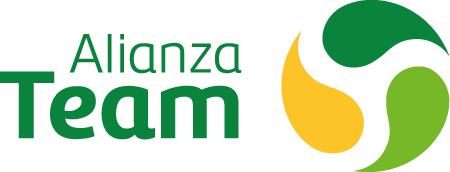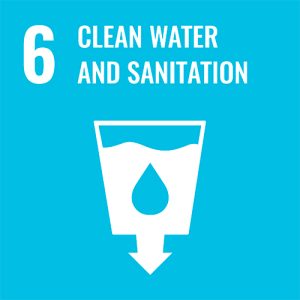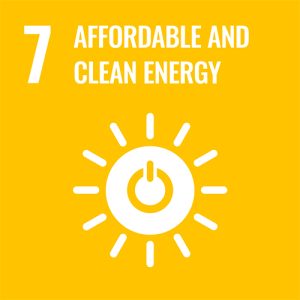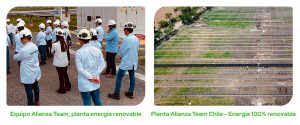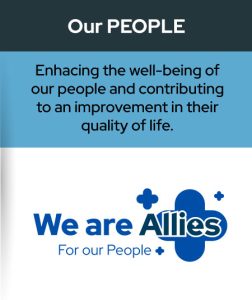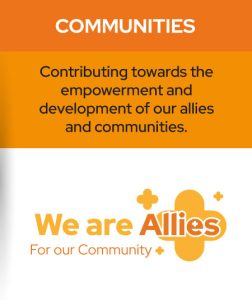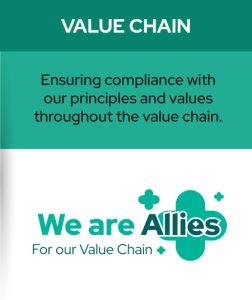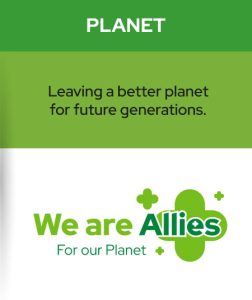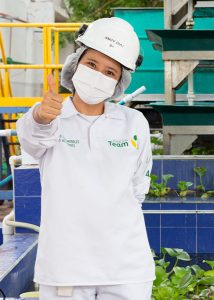
It is no surprise that the most relevant material issue for our stakeholders and the organization is climate change management. As humanity, it is one of the most important risks we are facing because of its relationship with other aspects not only environmental but also economic and social. The impacts of climate change are not only being felt more frequently, but also more intensely, and with this, its catastrophic capacity is rapidly increasing. We updated our commitments to be allies for the planet in our 2030 Vision, and we continue to work towards becoming carbon neutral in our direct operations, along with the implementation of a climate strategy that has a full scope of our supply chain. We know that due to the magnitude and severity of the environmental challenges, we cannot work on them alone; we have the obligation to align ourselves with the main international commitments and frameworks so that together we can contribute to the solution.
→ Top developments:
- Revision of historical information 2016-2020 for all operations in water, energy, waste and emissions to establish corporate environmental goals aligned to the parameters of Science-Based Targets.
- Preliminary survey of risks associated with climate change – physical and transitional – for all operations in conjunction with Corporate Risk Coordination.
- Baseline report on our Scope 3 carbon footprint, analyzing 13 of the 15 categories and identifying the most relevant work fronts for the coming years.
- Expansion of Manos Verdes’ reach as a program and corporate capacity in circular models to close the cycle by linking several global clients.
- We achieved the approval of theChilean I Choose to Recycle seal for 30 of our products at BredenMaster and 9 products of the Kardamili brand at Team Foods Chile, advancing towards our goal of achieving 100% of our packaging with a high potential to be recycled.
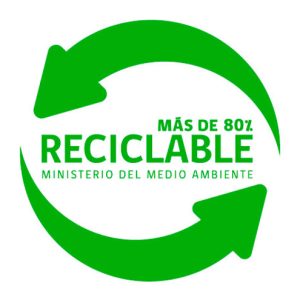
- We formed a Corporate Packaging Committee to unify the information system and consolidate the initiatives in our 4 strategic axes of the packaging commitment. This allowed us to report for the first time to measure the indicator of materials used by weight at the corporate level and verify it by a third party.
Differentiate our own operations, reducing direct environmental impacts to a minimum.
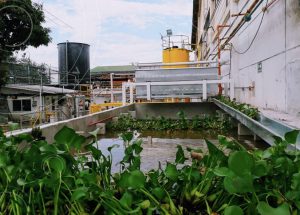
WWTP
Our commitment from our direct operations is to ensure environmental protection and the prevention of environmental pollution by managing the impacts in our facilities and throughout the supply chain, ensuring the responsible use of natural resources and implementing practices and processes that allow us to continuously improve our environmental indicators.
We know that this goes hand in hand with technological and process renewal, so we continually invest in our operations to be prepared for the operational challenges of the future. We highlight the installation of a margarine production line at the Barranquilla facilities and the start of operations at the new refinery in Buga. Also, in Mexico, we inaugurated an automated scale remotely monitored from the Colombian operation, which will allow us to improve the accuracy and safety of our processes, as well as a redesign of the interesterification process at the beginning of 2023, which is expected to represent significant savings in water consumption. Together with the alignment and implementation of international standards through our credentials, we work in a comprehensive way to lead by example and contribute to leave a better future for the next generations.
We continued on the path of defining our strategic corporate environmental goals for the year 2030, for the issues of climate change, energy, water management and circular economy with the help of our expert consultant GAIA Environmental Services. We conducted a diagnosis, review, adjustment and standardization of environmental indicators, to ensure the accuracy of the data and a benchmarking process, in order to know the main trends in global commitments.
So far, we have achieved a partial definition of our goals, which are pending feasibility analysis and we expect to present them to our stakeholders in our next report.
Water
[T15; 303-3]
[ODS 6.3; 6.4]
Water is the third most important material issue for Alianza Team, and we strive to continually improve the efficiency of its use and to implement initiatives to recirculate or recycle water, reducing pressure on natural water sources.
In 2022, we achieved a 2% improvement in our water intensity indicator, which means that the amount of water used per packaged ton was reduced.
See more
This result was possible thanks to the increase in the amount of water recirculated at the corporate level for a total of 121,772 cubic meters, mainly due to an increase in condensate recovery and other activities of 19%, an amount of water equivalent to 483 50-meter Olympic swimming pools and other projects such as the reuse of water from the cooling towers and the closing of steam and water leaks.
It is important to highlight that the Barranquilla plant contributes 39.5% to the recovery of condensates at corporate level, and although this process has been carried out for some years, only now we have traceability of the volume of water recirculated in other processes of the operation.
The Barranquilla plant joined the water treatment model of Buga and Mexico, adopting 53 Barbules, 15 Koi Carp and 15 Coroncoro in its treatment system. Two of these fish are native to the Caribbean region, which demonstrates that the quality of the water returned to the source generates the minimum impact on aquatic ecosystems.
Energy
See more
Our Team Foods Chile facilities have been supplied with renewable energy from the Huatacondo Solar Park since April 2021 and as of January 2022 our BredenMaster facilities are supplied by the San Juan wind power plant operated by our ally IMELSA, also obtaining the IREC certificate (International Renewable Energy Certificate).
In February 2023, the operation of the Solar Farm of our ally Celsia began, which supplies part of the electrical energy for the operation of the Buga facilities; this is equivalent to approximately 300,000 kWh/month of renewable energy and a reduction of 410 tons of CO2e per year. For next year, we will continue to move forward with the green energy certification for our facilities in Colombia.
On the other hand, we celebrated the certification of the Energy Efficiency Program under the ISO 50001:2018 standard at BredenMaster. With this program, we have already reduced the electrical energy efficiency indicator by 1.7% and we will continue working on initiatives to reduce energy consumption per packaged ton.
Regarding the energy intensity indicator, our Mexico facility managed to reduce its energy consumption per packaged ton. However, we have an opportunity for improvement in the other facilities, since we had an increase in the use of refrigerants in BredenMaster and in the use of fuels in the other facilities, which impacted the corporate indicator.
For 2023, important projects have been approved for technological upgrading of boilers and refrigeration systems to improve the energy efficiency of the facilities.
Waste
[306-1; 306-2; 306-3; 306-4; 306-5; T17]
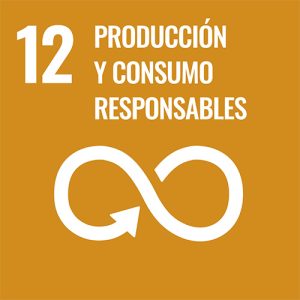
[ODS 12.2; 12.3; 12.4; 12.5]
We manage our waste from a circular economy approach, seeking to minimize the use of materials in the operation and increase the percentage of waste recovery through the constant search for partners with innovative technologies that generate less environmental impact.
See more
Some of this year’s achievements were:
- A 6% increase in the use of waste at our Mexico facilities, in conjunction with the Morelia City Council and municipal and state collection companies.
- 49% reduction in the use of plastics and cardboard through the Waste + Choices initiative in the Buga facilities.
- Decreased the purchase cost of wooden pallets by 62% through the return for reconditioning of customers’ broken pallets at BredenMaster and Team Foods Chile.
- Reconditioning of 2,880 kg of chemical product containers at the Bogotá facilities that were no longer definitively disposed of in the safety cell.
- Valorization and transformation of 19% of the hazardous waste in Buga through a new manager with state-of-the-art technology.
To achieve these results, the awareness and empowerment of our employees has been crucial.
We are proud to announce that our Bogotá facilities received for the fourteenth consecutive year the recognition of the District Environmental Excellence Program (PREAD) in the Elite category. For 2022, it was one of the 36 best companies in the district.
Green at Heart
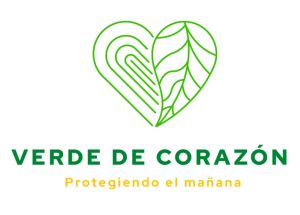
Verde de Corazón está conformado por un grupo de colaboradores que buscan impactar de forma positiva nuestro planeta, participando activamente en iniciativas ambientales y sociales. Su acción los convierte en multiplicadores de la cultura ambiental para dejar un mundo mejor a las siguientes generaciones.
Verde de Corazón is made up of a group of employees who voluntarily seek to positively impact our planet, actively participating in environmental and social initiatives. Their actions turn them into multipliers of environmental culture to leave a better world for future generations.
During 2022, 16 environmental education activities were carried out, with the participation of around 600 employees, children and communities surrounding our operations, including campaigns and awareness-raising activities focused on waste, water, sustainable mobility, biodiversity, among others.
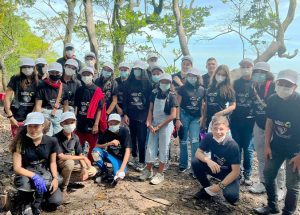
Green at heart volunteers participating
We planted 740 trees in impact areas such as watersheds, mangroves, and vulnerable communities near waste disposal sites. These trees will supply the oxygen demand of 33 people.
Promote climate change adaptation and mitigation actions along the supply chain
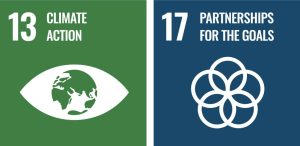
[ODS 13.1; 13.2; 13.3; 17.7]
Building our climate strategy
[201-2]
At Alianza Team we understand climate change as an opportunity to create value in our businesses. Driven by innovation, collaboration and risk management along the supply chain, we will be able to provide solutions with low climate impact and high value for our society.
The agricultural sector is one of the most vulnerable to the impacts of climate change, so to ensure business resilience we are acting proactively to mitigate risks, capitalize on opportunities and anticipate the financial and operational impacts it brings in this new global landscape. To this end, we follow the recommendations of the Task Force on Climate-related Financial Disclosures – TCFD, in its four core elements: governance, strategy, risk management, and metrics and objectives.
See More
The monitoring of risks associated with climate change is integrated into our Corporate Risk Management Model, from which operations in our 7 production facilities are supervised. Additionally, these risks are analyzed in our Supply Chain Monitoring and Verification tool – Ubuntu, which covers the organization’s current and future supply chains. Relevant findings and issues are reported and discussed through the Audit Committee. Sustainability Management is responsible for mobilizing the climate strategy at all levels of the company and bringing relevant issues such as the definition of goals, commitments and strategies to the Chairman’s Committee and the Board of Directors for approval.
We are working on assessing risks and opportunities at the local level through workshops with operations to identify impacts, controls and collect the necessary data to address the financial impact analysis in a second stage. We have prioritized the analysis of seven acute and chronic physical risks and fourteen transitional risks, including legal, reputational, technological and market risks in our own operations and upstream activities, which, if they materialize, could have significant impacts.
By the end of 2023, we will have made progress in risk assessment and scenario analysis for the prioritized risks, calculation of the financial impact and formulation of adaptation plan.
Carbon footprint
[305-1; 305-2; 305-3; 305-4; 305-5]
Scopes 1
Direct GHG emissions from sources controlled by the company, from activities such as combustion in boilers and the use of refrigeration equipment.
Scope 2
Indirect GHG emissions from the production of the electricity we purchase.
Our management approach to achieving carbon neutrality in Scopes 1 and 2 focuses on reducing greenhouse gas (GHG) emissions so that we can contribute our efforts to limit warming to 1.5°C. While we are following the guidelines, we do not yet have a timeline for submitting the target for validation by the Science-Based Targets initiative (SBTi).
By 2022 we achieved a milestone reduction of 56.31% of scope 2 emissions by the market-based method, equivalent to taking 1,774 gasoline-powered passenger vehicles off the road for one year. This was achieved mainly as a result of the use of 100% renewable energy at Team Foods Chile and BredenMaster, generating 0 emissions according to the IREC certificate for the market-based calculation method.
The emissions intensity indicator, which corresponds to GHG emissions of Scope 1 and Scope 2 per packaged ton, improved in Mexico and Team Foods Chile and remained the same in Colombia. However, the corporate indicator increased mainly due to refrigerant gas leaks at BredenMaster, where the work plan for technology upgrades and the use of lower-impact refrigerants is already being deployed.
See more
The results of this indicator reflect the need to work more firmly on improving the energy efficiency of the facilities, which requires transformations in the processes that reduce emissions more effectively. In this sense, we are working on the substitution of refrigerant gasses with high global warming potential (GWP), the reduction of losses, and technological upgrades to reduce natural gas consumption.
We have joined three government programs in Colombia in an effort to strengthen our climate management. We received certification for our participation in group 2 of the National Carbon Neutrality Program and participated in the closing panel sharing our experiences in emissions management. We also participated in the Carbon Neutral Valley project from the Buga facilities and from the Barranquilla facilities in the calculation of the Carbon Footprint of the Industrial and Port Sector for the city of Barranquilla, initiatives that seek to empower companies to achieve national objectives.
The definition of the baseline and its verification by a certifying entity is a crucial element that we will address in the following year, followed by the definition of the decarbonization and compensation plan.
Scope 3
Scopes 3
Indirect GHG emissions produced by pre- and post-operational activities in the facilities, which are in the control of third parties such as suppliers and customers but are part of the product impact under a life cycle approach.
Understanding that our impact goes beyond our own operations, we conducted for the first time a scope 3 inventory using the GHG protocol tool -Scope 3 evaluator, for 13 of the 15 categories defined by the GHG protocol for the period 2021.
We found that of the scope 3 emissions generated by pre- and post-production activities, 91.57% of GHG generation is due to the acquisition of goods and services, consolidating as the most relevant category, followed by the transportation of finished product with 4.62% and the BredenMaster baking and refrigeration equipment commoditization model with 1.31%. The other categories have small contributions totaling less than 1.5% of the total carbon footprint in scope 3.
See more
We do not report absolute emissions data in this report as we are working on calculating the 2022 inventory for the relevant categories.
Our mitigation approach in Scope 3 will be to transform the supply chain towards decarbonization, resilience and regeneration. Our efforts will be focused on investment and collaborative work with strategic suppliers in the agricultural chain, positively impacting ecosystems and communities.
By linking an action plan to our Responsible Sourcing Strategy, we will strengthen the climate performance of our partners to reduce their Scope 1 and 2 emissions.
We will include emissions criteria in our procedures so that they become part of our purchasing and service contracting decisions, involving strategic and decision-making areas, thus strengthening our climate governance.
As an example of mitigation management in scope 3, in October 2022 we began the implementation phase of the Optimus II logistics optimization program, which managed to increase the weight of cargo per vehicle by 9%, which means that by 2023 we will stop moving an average of 204 tractor-trailers and travel 80,000 km per year, a distance equivalent to circling the planet two times, avoiding the generation of 109 tons of CO2e*. In addition, through the Green Footprint program, we have managed to reduce emissions associated with the replacement of virgin plastic pallets with post-consumer recycled plastic pallets, which represents a reduction of 113 tons Co2e in the last 5 years. 63% approximately of the element purchase footprint between 2018 and 2022.
In recognition of these actions, we were nominated for the Zona Logística awards in the categories Large Company with the “Optimus” initiative and Environmental Logistics with the “Green Footprint” initiative.
* [1] UPME 2016, Calculadora Factores de Emisión Para Combustibles Colombianos (http://www.upme.gov.co/calculadora_emisiones/aplicacion/ayuda.html) – Actualizada Diciembre 7 de 2016
Leading the change towards a more sustainable world from our businesses and brands through innovation and circularity
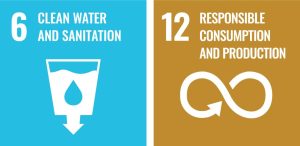
[ODS 6.3; 12.4; 12.8]
Manos verdes
[T25]
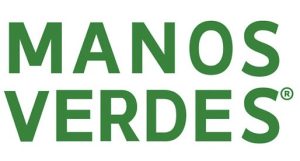
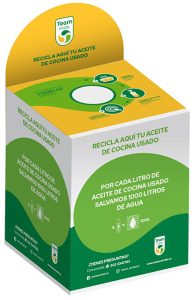
Manos Verdes used cooking oil recycling program.
At Manos Verdes, we strive to ensure that not a single drop of used oil contaminates the water or harms people’s health.
Our actions allowed us to increase our collection volume by 30% in 2022 for a total of 3,188 tons of ACU and other oily waste, which were transformed into second-generation biodiesel, i.e. produced from waste.
The use of this fuel avoids emitting approximately 10,335.2 tons of CO2e (ISCC Standard) compared to the use of fossil diesel, which is equivalent to taking 2,227 vehicles off the road each year. In addition, we avoided contaminating 3,465 million liters of water due to inadequate oil management, the equivalent of 1,382 Olympic swimming pools.
We raised awareness of the environmental impact and proper management of used cooking oil in more than 6,000 establishments in the HORECA sector in Colombia and replicated the message to nearly 150,000 families through our presence in residential units, reaching a total of 2,086 collection points, consolidating Manos Verdes as the largest platform for the collection of used cooking oil for consumers in the country.
See More
This achievement was possible thanks to our strategic alliance with D1 Stores, which allowed us to reach 423 points in the cities of Bogotá, Santa Marta, Cali, Medellín and Barranquilla. We also managed to reach places as remote as the island of San Andrés, where we accompanied D1 Stores in a beach cleanup activity and launched our collection program.
We worked on extending our value proposition of product life cycle closure to other industrial fatty wastes, contributing additionally to minimize food loss and waste.
With this value proposition in mind, we helped our client Upfield not only to properly manage their returns and breakdowns, but also to find solutions to take advantage of their plastic packaging waste. This is how we reached Saju, a Colombian company with an extraordinary circularity vision that was able to transform their waste into 50 pairs of eyeglasses. Other plastics were transformed into 25 pallets for logistical use by our partner Muta, transforming waste into opportunities.
Nurturing a better tomorrow also includes taking care of people’s health, so as an added value we advise 100% of our customers in the HORECA sector for the timely change of frying oils, ensuring the quality and reputation of their brand.
Packaging
[301-1]
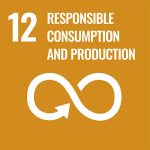
[ODS 12.2; 12.5]
Moving towards circularity is one of our material issues and its relevance lies not only in securing the resources needed for production in a world with growing demand and finite resources, but also in the fact that this economic model presents valuable opportunities to move towards a more efficient, friendly and collaborative business model.
Part of this approach is to rethink our packaging materials to generate a positive impact throughout the supply chain, from the moment of purchase, through design, to ensuring that they are reused at the end of their useful life. For this reason, we have declared through our Policy Guidelines our commitment to ensure that 100% of our packaging has a high potential to be reused or incorporated into a local production cycle, minimizing the possibility of ending its life in a landfill or in a water source. This is achieved through the four pillars that frame our packaging initiatives: reduction, recyclability, reuse and recovery.
As part of our commitment, we have formed an interdisciplinary group at the corporate level, which by 2022 met the 3 proposed objectives: to understand the regulatory requirements by country; to establish a baseline of materials; and to understand the flows and consolidate the initiatives. By 2023 we will work on having a robust information system that will allow us to find opportunities and effectively evaluate our management, as well as establish quantitative goals for our strategy.
See More
Reduction – The lightening of our packaging is an effort that we have been actively working on for the last ten years in the organization. In the last five years, working hand in hand with Amcor, we have achieved a total reduction of approximately 506 tons per year in the reduction of virgin plastic used for the different presentations. We highlight our cross cutting approach to packaging engineering, since we have not only achieved a reduction of up to 31% of PET in some presentations, but we are also working with caps and migrating to other materials, taking into account the capacity for local post-consumer use. The developments in eco-design represent a great technical challenge due to the nature of the product they contain, where we must not only work to reduce the environmental impact but also ensure the integrity and innocuousness elements that allow our products to reach their final destination in optimum conditions.
Recyclability – We eliminated the use of white pigment in 100% of the tubs used to package margarine in Campi cups, facilitating the post-consumer use of this material, and we focused our efforts on finding the best packaging solutions for our products, so we have conducted exploration and tests to replace multi-material packaging currently used in our products with mono-material solutions that have a much higher recyclability potential.
In Chile, we were able to develop a collaborative public-private agenda for the implementation of the national eco-labeling pilot program, in order to influence consumers’ purchasing preference for products marked with the “I choose to recycle” seal. To date, 30 BredenMaster containers and 9 Kardamili brand containers have been labeled.
Seeking to understand the gaps and find opportunities to improve our management in the chain, we have joined Amazóniko, a collaborative recycling platform that connects the actors in the recycling chain to enhance waste management, train consumers and dignify the work of recyclers. We are also forming the Alianza Team Tribe, linking our employees to this platform to train our employees and their families in the proper management of waste at home.
Leveraging – During 2022, 100% of the plastic used in the bottles of 9 of the 11 references of the Gourmet brand were manufactured with PCR plastic – 100% post-consumer recycled origin, thus avoiding the use of 145.4 tons of virgin plastic, which is equivalent to a 59% reduction in the emissions of this packaging. We continue to work to include post-consumer recycled materials in our packaging -primary, secondary and tertiary- to guarantee the closing of the cycle of our materials. In Mexico, for example, we work with suppliers that provide us with all our cardboard from 100% recycled sources.
In order to ensure that our packaging is effectively collected and used, preventing the materials from ending up in landfills at the end of their useful life, we actively participate in four collectives, one in Colombia and three in Chile, through which we collaborate with actors in the post-consumer chain such as processing industries, recycling collectives, academia and government, among others. We know that our packaging also involves greater complexity for its reuse due to the fatty residue, so in these groups we also work on strengthening the installed capacity and cooperation among actors to find solutions to the technological and operational challenges we face.
In Chile, we are founding partners of the GIRO Collective Management System and partners of the RESIMPLE and PROREP collectives to finance the operation of household waste recovery and monitor compliance with the collection and recovery goals established by the EPR law, which will begin in 2023. In Colombia, through our participation in the Vision 30/30 collective and with the efforts of 333 related production companies, we were able to collect and use 58,276 tons of packaging waste, representing 12% of the packaging placed on the market in the base year 2019, meeting the national goal.
* [2]The NDPE IRF is a tool for assessing and reporting progress towards NDPE commitments (No Deforestation, No Peat Expansion and No Exploitation across a company’s supply base). For more information visit: https://www.ndpe-irf.net/
#SumarPorElPlaneta

[ODS 4.7; 13.1; 13.3; 15.2; 17.6; 17.7]
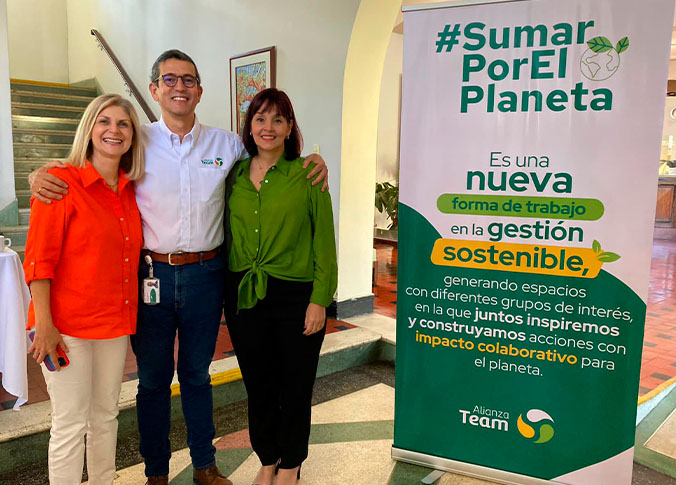
Forum #SumarPorElPlaneta
It is an initiative that seeks to inspire, exchange positive experiences and strengthen collaborative work networks with different stakeholders in the supply chain, being agents of change to positively impact our planet and our communities. We also seek to strengthen knowledge for sustainable development towards carbon neutrality, as part of the corporate commitments in line with the good environmental practices of the organizations.
In our II Industrial Environmental Forum #SumarPorElPlaneta we reached 155 people and more than 44 companies in the transportation sector. We also expanded our reach by inviting our customers, suppliers, local authorities and members of the community. We gathered in Buga in this third version to exchange positive experiences of carbon footprint reduction, challenges and opportunities to act against climate change with customers, expert advisors, suppliers, community members and environmental entities. One of the main results of the event was that the department’s environmental authority, the Corporación Autónoma Regional del Valle del Cauca (CVC), confirmed the continuity of the quotas allocated for its Carbon Neutral Valley program and also allocated 7 more quotas for other industries attending the II Environmental Forum to participate in this program.
In Bogota, together with our expert advisor CECODES, we conducted two workshops on air quality and climate change for 26 of our allied logistics suppliers and held volunteer sessions to promote good practices in this area.
In Barranquilla, we created a working group under the slogan #SumarPorElPlaneta, formed by the Mayor’s Office, the environmental authority, the JAC of Barrio Abajo, foundations and 5 private companies in the sector to work on activities to intervene in the environmental and social problems of the sector and coordinate actions for the benefit of Barrio Abajo.
In Mexico, after a virtual forum in 2021 focused on climate change and water risks, a constant work network is maintained with neighboring companies to keep working together adding efforts for the planet.
Acknowledgments
To all those who daily connect with the corporate purpose of nurturing a better tomorrow, doing their work with passion, courage, enthusiasm and humility so that together we can make progress on the different work fronts and fulfill our corporate commitments, meeting the expectations of our stakeholders by being allies for our people, communities, supply chain and planet. Only together can we become one of the world’s most sustainable companies in the food industry according to the annual corporate assessment of S&P Global, the basis for the Dow Jones Sustainability Index.
Special thanks to the more than 150 people in all businesses, countries, operations and teams who actively contribute to the assessment and reporting cycle by providing timely quantitative and qualitative information on their processes, operations, countries and projects for the construction of this report. And finally, thanks to the Sustainability, Communications and Digital teams for making it a reality.
Suscríbete a nuestro Newsletter
Entérate de novedades en la alimentación
